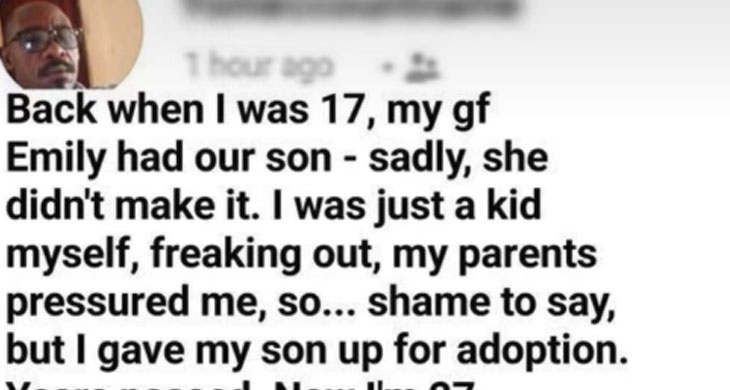Back when I was seventeen, my girlfriend, Emily, and I had a baby boy. We named him Jonathan. But only a few hours after he was born, Emily passed away from complications during childbirth. I was young, confused, and completely heartbroken. I didn’t know how to be a father. My parents, worried about my future, urged me to give the baby up for adoption. They said it was best for everyone. In my fragile state, I agreed. I signed the papers, and my son was taken away before I could fully understand what I was doing.
For a long time, I tried to push the memory out of my mind. Each time I saw a baby stroller or heard a child cry, I felt a sting in my heart. I grieved not only for Emily but also for the son I never got to hold. I never told anyone in my adult life about it, partly because I felt ashamed, partly because it was too painful to talk about. Over the years, I became certain I would never see my child again.
I’m twenty-seven now. A few months ago, I began volunteering as a little league baseball coach in my neighborhood. I wanted a way to connect with the community and use some of my free time for something positive. I’ve always loved baseball, so being around kids learning to swing a bat and catch a ball brought me a kind of peace I didn’t expect.
On the first day of practice, I greeted the team of small, energetic kids. Most of them were around nine or ten years old. They were bouncing with excitement, wearing oversized caps and dragging their baseball gloves in the dirt. I remember laughing at how the uniforms were too big for half of them, with sleeves flopping around their thin arms.
Then I noticed a boy named Robert. He had bright eyes, dark hair, and a quiet, focused look. Something about his face tugged at my memory. During drills, he tried his best, but I couldn’t shake the feeling that he looked oddly familiar. I just couldn’t place why.
As the season went on, Robert stood out for more than just his looks. He was a left-handed hitter, just like me, and had a certain tilt of his head when he listened to instructions that reminded me of Emily. But I shrugged it off, thinking maybe I was imagining things, searching for pieces of my past that weren’t really there.
One day, after practice, Robert’s mom came to pick him up. I started chatting with her, giving a quick summary of how Robert was improving at the plate. She said, “Thanks, Coach. He’s really taken a liking to baseball. Funny thing is, he said you remind him of… well, he says you feel familiar to him in a way.”
I felt my heart skip a beat, but I tried to keep my composure. I smiled and told her I was just glad Robert was enjoying the sport. But inside, my mind was spinning. Could this kid be Jonathan? It sounded crazy. I told myself I was jumping to wild conclusions. Yet, I couldn’t ignore how he had Emily’s nose and my eyes.
I started to pay closer attention to him: the way he laughed, the shape of his smile, the curve of his ears. Each small detail hammered home the idea that he might be my biological son. The thought made me dizzy—was fate really bringing him back into my life?
Eventually, curiosity won out. I talked to Robert’s mom again, more seriously this time. I tried to be respectful and not scare her off. I simply said, “He reminds me of someone I used to know very well. I know this might sound strange, but is there any chance Robert was adopted?” She froze for a moment, startled. Then, with cautious eyes, she nodded. “Yes, we adopted him when he was just a newborn.”
My hands shook at that moment. I asked if I could share something personal. She hesitated, but I think she saw the genuine emotion on my face. I explained that, ten years ago, I had given up a baby boy for adoption right after my girlfriend’s tragic death. Her face turned pale as she listened. Then I gently asked if we could do a DNA test to confirm if Robert was indeed my son. She took a deep breath and agreed, saying she wanted to do what was best for Robert.
Waiting for the test results felt like a lifetime. My mind replayed every memory of Emily, every moment we spent together, and the short time I spent at the hospital before giving my son up. I imagined how different life would have been if I had kept him, if Emily had lived, if we became a little family.
Finally, the results came back. My phone buzzed one afternoon, and I saw an email from the testing company. With trembling fingers, I opened it and read the words: The probability of paternity is 99.9%. Robert was my son. A flood of emotions hit me—joy, guilt, relief, and sadness all at once. I broke down in tears, kneeling in the middle of my living room, hugging my phone to my chest like it was the most precious thing in the world.
Robert’s mom and I had a long talk. She told me how they had always wanted Robert to know about his birth parents, but they only had limited information. She asked me about my life, about Emily, and about how I felt now that I knew the truth. We agreed to take things slowly. We didn’t want to confuse Robert or force him into a situation he couldn’t understand. He was only ten, after all, and we had to think of his best interests first.
Over the next few weeks, we arranged a quiet sit-down talk with Robert. He was shy at first, clearly confused by why this was so important. But as we gently explained that I was his birth father, tears welled up in his eyes. He looked at me with a mixture of wonder and apprehension. I tried not to cry, but a few tears slipped out when he asked, “Does this mean you’re my dad?”
I answered softly, “I’m your biological dad, yes. Your mom and dad who raised you are still your parents, and I respect them. But I’m here now, and I want to be part of your life if you want me to be.” Robert stared at me for a moment, then wrapped his arms around me in a hug. It was the first hug I’d ever received from my son, and it felt like a second chance at love I thought I’d lost forever.
Now I’m taking things one step at a time. I help him with baseball outside of team practice, giving him tips on his swing. Sometimes we grab ice cream afterward, or just sit and chat about his favorite video games. I don’t want to push too hard, but I’m eager to know him, to learn about his favorite foods, his dreams, and his fears.
I still feel guilt about giving him up ten years ago. But I also see the wonderful family he grew up with, and I’m grateful he wasn’t left alone. Maybe everything happened for a reason—maybe we’re meant to find each other now, at this point in our lives, and build a different kind of family.
So, here’s my question: if you discovered a child from your past and had the chance to reconnect, would you dive right in, or take things slow to respect the life the child has known?

